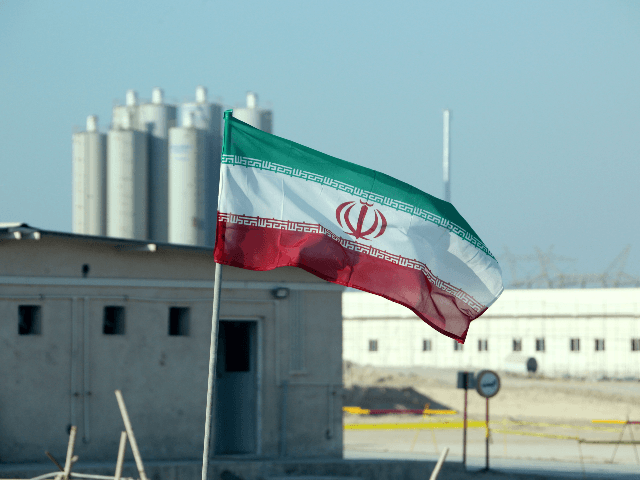Regime media in Iran denied on Friday that suspected Israeli airstrikes within Iranian territory in the early morning hours had caused any damage, while sympathetic outlets affiliated with terrorist proxy Hezbollah denied that any attack happened at all.
Reports surfaced early on Friday local time that suspected Israeli planes and drones had targeted several cities in Iran, Syria, and Iraq, near locations believed to be affiliated with Iran’s Islamic Revolutionary Guard Corps (IRGC), a state terrorist organization, and with Iran’s illicit nuclear program. The reports raising the most concern involved sounds of explosions near the city of Isfahan, where Tehran is believed to host as a nuclear development site.
Iran has for decades called for the genocidal eradication of the state of Israel. More recently, it has engaged in belligerent action through its terrorist proxies, most prominently the October 7 siege of the country by Iranian-backed terrorist group Hamas, which resulted in the killing of an estimated 1,200 people, mass abductions, and reports of gang-rape, torture, desecration of corpses, and infanticides.
On April 1, a suspected Israeli airstrike targeted an Iranian consulate in Damascus, Syria, killing seven IRGC officials including Quds Force commander Mohammad Reza Zahedi, who IRGC affiliates credited with helping plan the October 7 attack. Iran claimed to retaliate for this strike, which Israel has not at press time taken responsibility for, on Saturday, launching an unprecedented barrage of ballistic missiles, cruise missiles, and drones at Israeli territory. The attack was a dramatic failure – Israel and its neighbors intercepted “99 percent” of the flying threats, including all drones and cruise missiles. Minimal damage and only one casualty, an injured Arab Bedouin girl, were reported.
Reports on Friday out of Israel suggested that Jerusalem had begun operations targeting Iran in response. Comments from some Israeli officials suggested that Israel was behind the strikes. Yet rather than express outrage against Israel and threaten a response, Iranian media and unnamed officials refused to acknowledge that the attack had even occurred.
Iran’s PressTV propaganda outlet acknowledged “the sound of explosions” near Isfahan and the presence of “suspicious objects” in the air. It reported, however, that “important facilities in the Isfahan province, especially nuclear facilities, are completely safe and no incidents have been reported,” quoted an Iranian Army official, Brigadier Siavash Mihandoust, on the record.
Another Iranian official, Space agency spokesman Hossein Dalirian, declared decisively, “No foreign aerial attack has been carried out so far against Isfahan or other areas of the country.”
Other Iranian state outlets and affiliated agencies similarly dismissed the incident. The state-run Islamic Republic News Agency (IRNA) described what occurred as a “relatively loud noise” rather than an attack. Al-Mayadeen, an Islamist media outlet associated with Iranian terrorist proxy Hezbollah, claimed that its sources in Iranian government affirmed an Israeli attack on Iran “did not occur” and the reported suspicious objects in the sky “were likely launched domestically.”
“What is being circulated about an Israeli attack on Iran are lies and are part of a misinformation war, according to our sources,” the pro-jihadist outlet claimed.
Al-Mayadeen also claimed that Iranians were using heavily censored social media outlets to “ridicule the Israeli strike,” apparently contradicting its own reporting that an Israeli strike never occurred.
The Times of Israel noted that commentary from Israeli officials suggested that Israel had indeed launched a limited operation against Iran, apparently intended to indicate to Iran that the Israeli air force could cause significant damage within Iran’s borders if it chose to. The newspaper quoted a “Netanyahu confidant,” Natan Eshel, who said the strikes meant to indicate “that we [Israel] can infiltrate and strike within their borders and they weren’t able to inside ours.”
A public recognition that Israel had infiltrated its borders would put pressure on Iran to back up its belligerent threats to essentially launch a full-scale war against Jerusalem. Hours before the strikes, speaking at the United Nations Security Council in New York, Iranian Foreign Minister Hossein Amir-Abdollahian vowed that Tehran would make Israel “regret” any response to the failed April 13 attack on the Israeli homeland.
“Iran’s legitimate defense and countermeasures have been concluded. Therefore, the Israeli regime must be compelled to stop any further military adventurism against our centers, assets and interests,” Amir-Abdollahian said.
“Certainly, in case of any illegal use of force by the Israeli regime, the Islamic Republic of Iran will not hesitate a bit to assert its inherent right to give a decisive and proper response to it to make the regime regret its actions. This is an unchangeable decision,” the top diplomat promised.
In a subsequent interview with CNN on Thursday, Amir-Abdollahian promised that, should Israel respond to the Iranian failed strikes, Tehran’s “next response will be immediate and at a maximum level in case the Israeli regime embarks on adventurism again and takes actions against the interests of Iran.”
Iranian President Ebrahim Raisi had similarly threatened Israel in remarks on Monday following the failed strikes, vowing a “fierce, widespread, and painful” response if Israel chose to defend itself from further attack.
Follow Frances Martel on Facebook and Twitter.

COMMENTS
Please let us know if you're having issues with commenting.